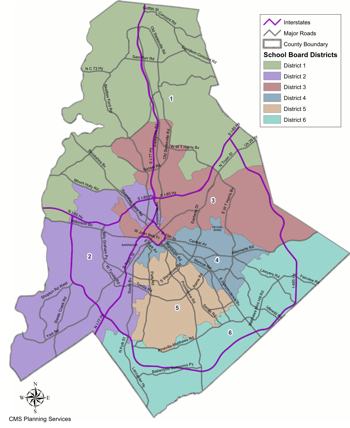July 19, 2010
Schools in descending order of white enrollment at the end of the first month of the school year, fall 2009. Sources: N.C. Department of Public Instruction, CMS.
Comparing 2010 fourth-graders to 2009 third-graders at Central Zone schools, 36 schools saw increases in reading scores, while 8 saw decreases.
But between 2010 fifth-graders and 2009 fourth-graders, only 26 saw increases, while 18 saw decreases.
Parents may not think of the fourth- to fifth-grade step as a transitional year or one where the testing should be more rigorous. Perhaps it is. Or are the results a canary in the coal mine?
| ELEMENTARIES | Totl. | Bl | His | Wh | G3 '09 | G3 '10 | G4 '09 | G4 '10 | G5 '09 | G5 '10 |
|---|---|---|---|---|---|---|---|---|---|---|
| Providence Sp | 846 | 0.06 | 0.03 | 0.82 | ||||||
| Eastover | 588 | 0.14 | 0.02 | 0.82 | ||||||
| Davidson | 889 | 0.1 | 0.06 | 0.82 | ||||||
| Torrence Cr | 1187 | 0.11 | 0.04 | 0.79 | ||||||
| Selwyn | 772 | 0.14 | 0.05 | 0.79 | ||||||
| Beverly Wds | 747 | 0.14 | 0.05 | 0.79 | ||||||
| Olde Prov. | 673 | 0.13 | 0.04 | 0.78 | ||||||
| JV Washam | 934 | 0.12 | 0.07 | 0.78 | ||||||
| Huntersville | 799 | 0.14 | 0.08 | 0.77 | ||||||
| Sharon | 719 | 0.15 | 0.05 | 0.76 | ||||||
| Elizabeth Lane | 1035 | 0.09 | 0.04 | 0.76 | ||||||
| Bain | 1033 | 0.14 | 0.07 | 0.75 | ||||||
| Polo Ridge | 849 | 0.09 | 0.04 | 0.73 | ||||||
| McKee Rd | 500 | 0.13 | 0.05 | 0.73 | ||||||
| Cornelius | 699 | 0.14 | 0.12 | 0.7 | ||||||
| Hawk Ridge | 830 | 0.12 | 0.07 | 0.7 | ||||||
| Barnette | 732 | 0.22 | 0.08 | 0.67 | ||||||
| Matthews | 1023 | 0.19 | 0.08 | 0.67 | ||||||
| McAlpine | 513 | 0.19 | 0.11 | 0.65 | ||||||
| Elon Park | 891 | 0.16 | 0.05 | 0.64 | ||||||
| Park Road | 427 | 0.28 | 0.05 | 0.63 | ||||||
| Ballantyne | 778 | 0.18 | 0.07 | 0.6 | ||||||
| Myers Park | 738 | 0.36 | 0.04 | 0.58 | ||||||
| Endhaven | 694 | 0.18 | 0.12 | 0.57 | ||||||
| Highland Cr | 1222 | 0.32 | 0.06 | 0.56 | ||||||
| Chantilly | 252 | 0.37 | 0.06 | 0.54 | ||||||
| Cotswold | 587 | 0.37 | 0.1 | 0.52 | ||||||
| Clear Creek | 701 | 0.36 | 0.14 | 0.48 | ||||||
| Lansdowne | 564 | 0.41 | 0.11 | 0.47 | ||||||
| Croft | 690 | 0.43 | 0.05 | 0.46 | ||||||
| Blythe | 910 | 0.35 | 0.17 | 0.44 | ||||||
| Winget Park | 913 | 0.33 | 0.17 | 0.44 | ||||||
| Mountain Is | 834 | 0.46 | 0.05 | 0.44 | ||||||
| River Gate | 681 | 0.35 | 0.19 | 0.42 | ||||||
| Pineville | 672 | 0.28 | 0.26 | 0.41 | ||||||
| Long Creek | 486 | 0.5 | 0.06 | 0.4 | ||||||
| Smith Lang. | 1189 | 0.36 | 0.2 | 0.4 | ||||||
| Metro | 227 | 0.51 | 0.1 | 0.37 | ||||||
| Crown Point | 733 | 0.37 | 0.19 | 0.37 | ||||||
| Smithfield | 561 | 0.32 | 0.26 | 0.37 | ||||||
| Elizabeth Trad | 555 | 0.59 | 0.03 | 0.36 | ||||||
| Lake Wylie | 715 | 0.38 | 0.24 | 0.29 | ||||||
| Lebanon Rd | 753 | 0.42 | 0.33 | 0.23 | ||||||
| Berryhill | 329 | 0.18 | 0.5 | 0.22 | 0.623 | 0.523 | 0.564 | 0.761 | 0.65 | 0.706 |
| Mallard Cr | 665 | 0.54 | 0.11 | 0.21 | ||||||
| Greenway Pk | 580 | 0.51 | 0.28 | 0.2 | 0.65 | 0.514 | 0.755 | 0.656 | 0.674 | 0.8 |
| Whitewater | 464 | 0.59 | 0.15 | 0.19 | 0.472 | 0.636 | 0.537 | 0.641 | 0.7 | 0.679 |
| Paw Creek | 558 | 0.58 | 0.19 | 0.19 | 0.612 | 0.587 | 0.673 | 0.652 | 0.527 | 0.604 |
| Highland Mill | 230 | 0.72 | 0.07 | 0.19 | ||||||
| Collinswood | 529 | 0.23 | 0.57 | 0.19 | ||||||
| David Cox Rd | 906 | 0.65 | 0.1 | 0.18 | ||||||
| Rama Rd | 523 | 0.56 | 0.22 | 0.18 | 0.536 | 0.5 | 0.485 | 0.579 | 0.614 | 0.676 |
| Villa Heights | 304 | 0.68 | 0.01 | 0.18 | ||||||
| Dilworth | 538 | 0.71 | 0.1 | 0.17 | ||||||
| Reedy Creek | 793 | 0.6 | 0.19 | 0.17 | ||||||
| Berewick | 524 | 0.49 | 0.25 | 0.17 | ||||||
| Oakhurst | 576 | 0.68 | 0.11 | 0.16 | ||||||
| Pinewood | 529 | 0.4 | 0.42 | 0.16 | 0.583 | 0.444 | 0.563 | 0.5 | 0.488 | 0.561 |
| River Oaks | 554 | 0.7 | 0.11 | 0.15 | ||||||
| Steele Creek | 725 | 0.46 | 0.33 | 0.14 | ||||||
| Stoney Creek | 665 | 0.62 | 0.17 | 0.14 | ||||||
| J H Gunn | 700 | 0.5 | 0.33 | 0.14 | 0.522 | 0.52 | 0.647 | 0.496 | 0.546 | 0.637 |
| Piney Grove | 759 | 0.48 | 0.35 | 0.14 | 0.617 | 0.585 | 0.679 | 0.664 | 0.619 | 0.619 |
| Hunt'towne F. | 728 | 0.42 | 0.42 | 0.13 | 0.489 | 0.578 | 0.574 | 0.496 | 0.618 | 0.594 |
| Tuckaseegee | 810 | 0.54 | 0.25 | 0.12 | 0.632 | 0.612 | 0.705 | 0.734 | 0.627 | 0.65 |
| Univ Meadows | 641 | 0.65 | 0.18 | 0.12 | ||||||
| Idlewild | 801 | 0.55 | 0.3 | 0.1 | 0.593 | 0.693 | 0.697 | 0.709 | 0.73 | 0.744 |
| Oakdale | 626 | 0.74 | 0.13 | 0.09 | 0.531 | 0.619 | 0.656 | 0.533 | 0.475 | 0.633 |
| Barringer | 561 | 0.8 | 0.02 | 0.08 | ||||||
| Pawtuckett | 220 | 0.72 | 0.14 | 0.08 | 0.429 | 0.462 | 0.531 | 0.419 | 0.467 | 0.394 |
| Newell | 667 | 0.45 | 0.43 | 0.08 | 0.56 | 0.534 | 0.598 | 0.556 | 0.531 | 0.604 |
| Shamrock Gar | 338 | 0.65 | 0.23 | 0.06 | 0.5 | 0.559 | 0.593 | 0.618 | 0.561 | 0.545 |
| Hornets Nest | 867 | 0.67 | 0.26 | 0.06 | 0.478 | 0.392 | 0.537 | 0.561 | 0.544 | 0.624 |
| Morehead | 702 | 0.73 | 0.14 | 0.06 | ||||||
| Statesville Rd | 522 | 0.78 | 0.11 | 0.05 | 0.469 | 0.476 | 0.513 | 0.538 | 0.421 | 0.526 |
| Windsor Pk | 752 | 0.36 | 0.5 | 0.05 | 0.52 | 0.539 | 0.559 | 0.605 | 0.433 | 0.617 |
| Winding Sp. | 576 | 0.67 | 0.24 | 0.05 | ||||||
| Albemarle Rd | 960 | 0.43 | 0.46 | 0.05 | 0.491 | 0.497 | 0.458 | 0.539 | 0.46 | 0.469 |
| Grier | 849 | 0.61 | 0.3 | 0.05 | 0.474 | 0.568 | 0.552 | 0.578 | 0.613 | 0.605 |
| University Pk | 525 | 0.85 | 0.07 | 0.05 | 0.67 | 0.686 | 0.583 | 0.624 | 0.681 | 0.674 |
| Nath. Alex. | 1014 | 0.7 | 0.2 | 0.04 | 0.435 | 0.528 | 0.455 | 0.521 | 0.469 | 0.512 |
| Westerly Hills | 278 | 0.79 | 0.04 | 0.04 | 0.424 | 0.489 | 0.596 | 0.439 | 0.302 | 0.537 |
| Montclaire | 450 | 0.21 | 0.72 | 0.04 | 0.462 | 0.413 | 0.5 | 0.568 | 0.483 | 0.592 |
| Thomasboro | 312 | 0.75 | 0.08 | 0.04 | 0.4 | 0.379 | 0.296 | 0.511 | 0.386 | 0.438 |
| Briarwood | 679 | 0.55 | 0.37 | 0.04 | 0.419 | 0.504 | 0.413 | 0.536 | 0.417 | 0.462 |
| Billingsville | 452 | 0.61 | 0.22 | 0.04 | 0.302 | 0.185 | 0.491 | 0.262 | 0.383 | 0.29 |
| Sedgefield | 385 | 0.71 | 0.23 | 0.03 | 0.238 | 0.419 | 0.525 | 0.383 | 0.475 | 0.431 |
| Winterfield | 549 | 0.49 | 0.46 | 0.03 | 0.466 | 0.44 | 0.58 | 0.579 | 0.432 | 0.513 |
| Allenbrook | 421 | 0.67 | 0.16 | 0.03 | 0.287 | 0.468 | 0.325 | 0.43 | 0.382 | 0.478 |
| Hickory Grove | 972 | 0.6 | 0.35 | 0.03 | 0.469 | 0.563 | 0.565 | 0.5 | 0.429 | 0.519 |
| Merry Oaks | 555 | 0.37 | 0.52 | 0.03 | 0.456 | 0.52 | 0.585 | 0.622 | 0.646 | 0.556 |
| Lincoln Hts | 277 | 0.76 | 0.19 | 0.03 | 0.661 | 0.438 | 0.552 | 0.569 | 0.557 | 0.447 |
| Nations Ford | 600 | 0.44 | 0.53 | 0.03 | 0.366 | 0.357 | 0.573 | 0.473 | 0.468 | 0.5 |
| Sterling | 472 | 0.59 | 0.36 | 0.02 | 0.645 | 0.662 | 0.623 | 0.683 | 0.492 | 0.629 |
| Highland Ren | 477 | 0.64 | 0.31 | 0.02 | 0.463 | 0.494 | 0.506 | 0.578 | 0.471 | 0.652 |
| Irwin Avenue | 478 | 0.9 | 0.06 | 0.02 | 0.425 | 0.432 | 0.533 | 0.528 | 0.507 | 0.593 |
| W.G. Byers | 393 | 0.9 | 0.06 | 0.02 | 0.403 | 0.292 | 0.39 | 0.416 | 0.377 | 0.508 |
| Oaklawn Ave | 335 | 0.67 | 0.3 | 0.02 | ||||||
| Ashley Park | 245 | 0.92 | 0.04 | 0.02 | 0.325 | 0.389 | 0.458 | 0.487 | 0.308 | 0.581 |
| Devonshire | 504 | 0.53 | 0.42 | 0.01 | 0.419 | 0.485 | 0.652 | 0.495 | 0.592 | 0.733 |
| Hidden Valley | 611 | 0.51 | 0.46 | 0.01 | 0.636 | 0.615 | 0.431 | 0.717 | 0.578 | 0.544 |
| First Ward | 376 | 0.97 | 0.01 | 0.01 | ||||||
| Reid Park | 558 | 0.94 | 0.03 | 0.01 | 0.333 | 0.267 | 0.385 | 0.382 | 0.333 | 0.371 |
| Druid Hills | 392 | 0.89 | 0.07 | 0 | 0.386 | 0.5 | 0.436 | 0.373 | 0.345 | 0.351 |
| Bruns Ave | 528 | 0.91 | 0.07 | 0 | 0.424 | 0.395 | 0.291 | 0.556 | 0.375 | 0.312 |

